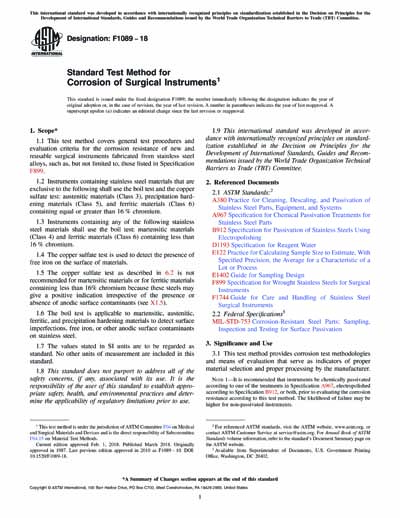Most recent
ASTM F1089-18
Standard Test Method for Corrosion of Surgical Instruments
1.1 This test method covers general test procedures and evaluation criteria for the corrosion resistance of new and reusable surgical instruments fabricated from stainless steel alloys, such as, but not limited to, those listed in Specification F899.
1.2 Instruments containing stainless steel materials that are exclusive to the following shall use the boil test and the copper sulfate test: austenitic materials (Class 3), precipitation hardening materials (Class 5), and ferritic materials (Class 6) containing equal or greater than 16 % chromium.
1.3 Instruments containing any of the following stainless steel materials shall use the boil test: martensitic materials (Class 4) and ferritic materials (Class 6) containing less than 16 % chromium.
1.4 The copper sulfate test is used to detect the presence of free iron on the surface of materials.
1.5 The copper sulfate test as described in 6.2 is not recommended for martensitic materials or for ferritic materials containing less than 16% chromium because these steels may give a positive indication irrespective of the presence or absence of anodic surface contaminants (see X1.5).
1.6 The boil test is applicable to martensitic, austenitic, ferritic, and precipitation hardening materials to detect surface imperfections, free iron, or other anodic surface contaminants on stainless steel.
1.7 The values stated in SI units are to be regarded as standard. No other units of measurement are included in this standard.
1.8 This standard does not purport to address all of the safety concerns, if any, associated with its use. It is the responsibility of the user of this standard to establish appropriate safety, health, and environmental practices and determine the applicability of regulatory limitations prior to use.
1.9 This international standard was developed in accordance with internationally recognized principles on standardization established in the Decision on Principles for the Development of International Standards, Guides and Recommendations issued by the World Trade Organization Technical Barriers to Trade (TBT) Committee.
Content Provider
ASTM International [astm]






